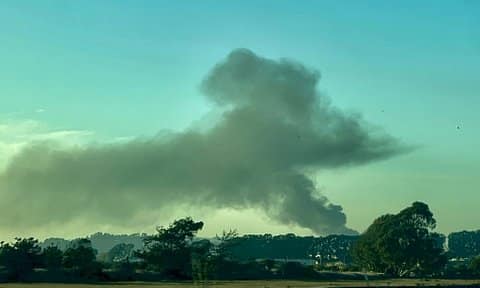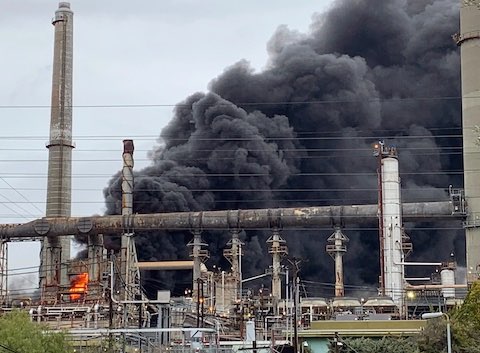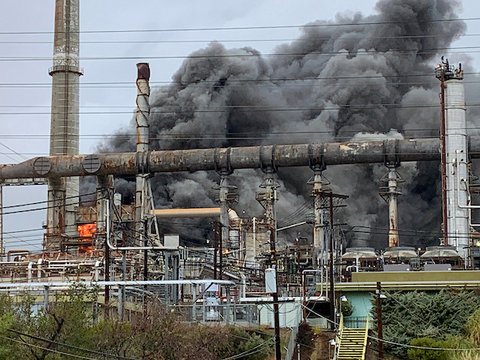
29 Mar Repeated Refinery Flarings Prompt Town Halls in Richmond, Martinez

This plume of smoke came from the Chevron Richmond refinery on Nov. 27, 2023, as a result of flaring. (Ana Tellez-Witrago for Richmond Confidential/file)
By Samantha Kennedy
The Chevron Richmond refinery has reportedly had several flaring events in just a few months, prompting a slew of complaints to air quality officials.
Richmond residents have long known the many ways the refinery can affect their lives — playgrounds wrapped in smoke, smelly gasses confining them indoors, chemical release drills in schools, just for starters. But while the issue is not new, the recent flares, which send plumes of black smoke and flames into the sky, have many residents concerned.
In response, the Asian Pacific Environmental Network and Communities for a Better Environment on March 21 held a “flaring town hall” at Peres Elementary School and online to inform Richmond residents of health risks from the Chevron refinery and how they can protect themselves.
“Flaring is not normal at all,” said CBE staff researcher Martine Johannessen. Johannessen says there are three excuses Chevron uses to justify its flaring — under the pretense of being a safer or more environmentally friendly option or being unavoidable. Flaring is avoidable, they say, if Chevron takes the necessary precautions.
Flaring happens when gasses produced as part of the oil refining process are burned in the air. Gasses released can worsen and contribute to certain health issues, especially respiratory conditions like asthma.
Richmond’s long history with Chevron incidents, including recent flaring events, was the reason APEN and CBE organized the town hall. CBE says the refinery has flared at least nine times just since November. That November, the Bay Area Air Quality Management District received 100 complaints for one flaring incident. One resident told Richmond Confidential in November she noticed an “intense smell of burning and gas” during one flaring that month that drew comparisons to the 2012 refinery fire. Multiple complaints of flaring on New Year’s Eve were followed by another flare less than a week later.
Youth leaders from the two organizations at the meeting gave a brief overview of the health impacts of Chevron’s flaring before providing the group with some tools the community can use.
CBE leaders stressed the importance of community in protecting each other from Chevron’s flaring, with many presentation slides stating: “We keep us safe.”
Youth leaders said, that because Chevron only has to self-report its incidents, community members should document everything. They can report what they see, smell or hear to BAAQMD online or at 1-800-334-6367.
Residents can also take action that will show immediate results. Leaders recommended creating a do-it-yourself air filter using a box fan as shown on the website of the Puget Sound Clean Air Agency. The air filter can be used together with other immediate actions residents can take during a flaring event, such as closing all windows
Action is not just necessary during events, according to leaders, but also during efforts to prevent them.
Some existing strategies to hold Chevron accountable for its flaring include signing a petition to give residents timely, accurate alerts regarding refinery incidents and participating at a BAAQMD board meeting. Community members can give a general public comment regarding Chevron’s flaring at the board’s next meeting April 3.
Another local refinery town has been dealing with flaring as well and has responded with a town hall of its own. Rep. Mark DeSaulnier hosted a town hall Monday in Martinez because of “numerous flaring and other chemical release events” at refineries there, ABC7News.com reported. In the past year, the Martinez Refining Company has reported at least 46 release incidents.
BAAQMD in February announced “unprecedented penalties” as part of a settlement that the Chevron and Martinez refineries will have to pay to further help impacted communities. Chevron will pay tens of millions of dollars for non-compliance with regulations after July 2026 and a $20 million fine for other violations.
That settlement also includes $20 million to go to a new Community Air Quality Fund, which will pay for projects that reduce airborne particulate matter in impacted communities.





No Comments